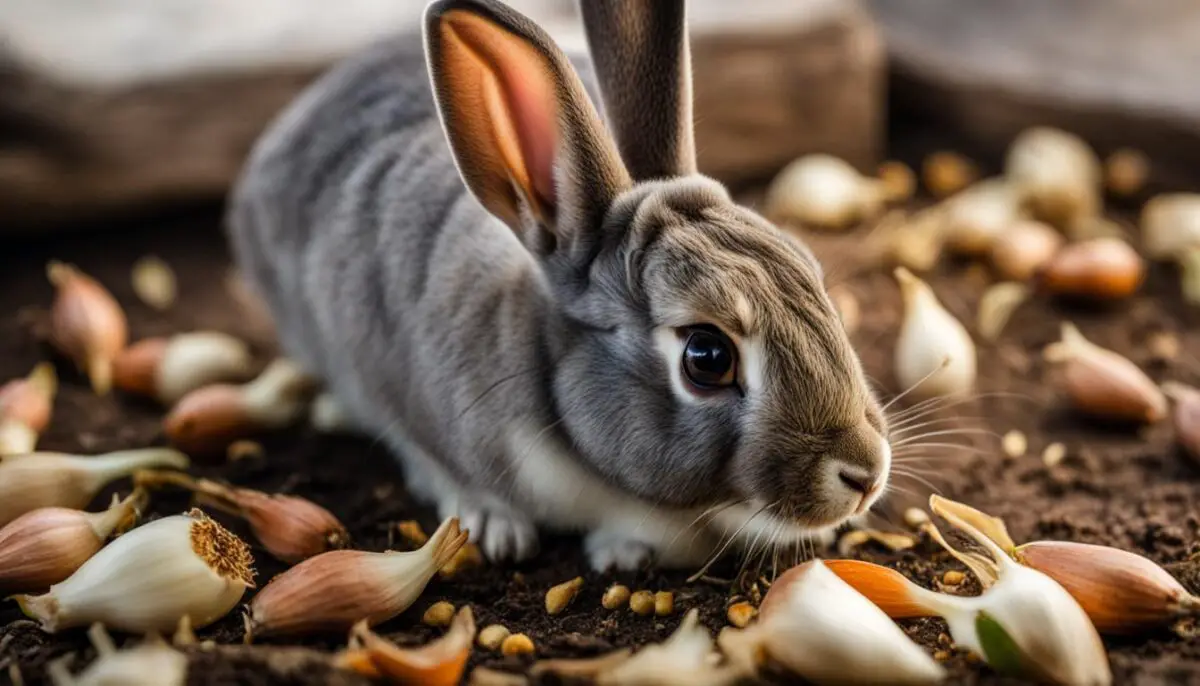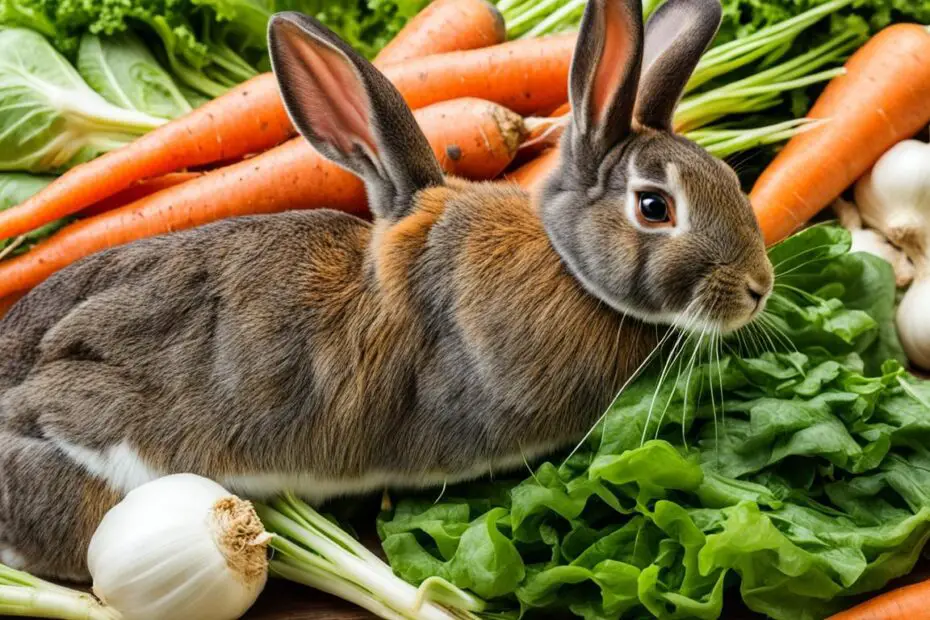Welcome to our article on rabbits and their dietary habits. Today, we will be addressing the question: do rabbits eat garlic? If you’re a rabbit owner or considering adding a rabbit to your family, it’s essential to understand what foods are safe for your furry friend and what foods should be strictly avoided.
Garlic, although commonly found in human cuisine, is considered a toxic food for rabbits. It’s important to remember that rabbits have a delicate digestive system, and certain foods can have adverse effects on their health. Garlic, in particular, can cause fatal gastric upset and other digestive issues in rabbits. This information is supported by multiple sources, including veterinarians and rabbit care experts.
Key Takeaways:
- Garlic is considered toxic for rabbits and should not be included in their diet.
- Rabbits have delicate digestive systems and can experience gastric upset from certain foods.
- It’s crucial to consult with a veterinarian or rabbit care expert to ensure a proper diet for your rabbit.
- Hay and fresh vegetables should make up the majority of a rabbit’s diet for optimal digestive health.
- Safe treats for rabbits include carrots, apples, and berries, but moderation is key.
Foods That Are Harmful to Rabbits
When it comes to your furry rabbit friend, it’s important to be mindful of what you feed them. There are certain foods that can be harmful or even toxic to rabbits, posing serious health risks. It’s crucial for rabbit owners to be aware of these dangerous foods and avoid including them in their pets’ diet.
Toxic Foods
Let’s take a closer look at some of the foods that can be harmful to rabbits:
- Yogurt drops
- Chocolate
- Milk and cheese
- Avocado
- Onions, garlic, and chives
These foods can cause gastric upset, digestive issues, and even be fatal to rabbits if ingested. It’s essential to keep them away from your furry friend’s diet.
Toxic Fruits
In addition to the above mentioned foods, certain fruits can also be toxic to rabbits when consumed in large quantities. It’s important to be cautious and limit their intake of the following fruits:
- Apple seeds
- Apricot pits
- Grapes
These fruits may contain substances that can be harmful to rabbits and lead to various health problems.
Safe Alternatives
To ensure the well-being of your rabbit, it’s crucial to provide a healthy and balanced diet. The majority of their diet should consist of high-fiber grass hay, which aids in proper digestion. In addition, fresh vegetables can be included to provide necessary nutrients. Some safe treats for rabbits include carrots, apples, and berries, but these should be given in moderation.
| Toxic Foods for Rabbits | Safe Alternatives |
|---|---|
| Yogurt drops | Carrots |
| Chocolate | Apples |
| Milk and cheese | Berries |
| Avocado | Leafy greens |
| Onions, garlic, and chives | High-fiber grass hay |
Remember, providing a safe and nutritious diet is essential for keeping your rabbit healthy and happy. Avoid feeding them dangerous foods and opt for the recommended alternatives mentioned above. Your furry friend will thank you!

Feeding garlic to rabbits can cause gastric upset and disrupt the balance of bacteria in their gut. This can lead to digestive issues, bloating, and even death in severe cases.
Rabbit owners should be vigilant and diligent in providing a balanced and safe diet for their furry companions. By avoiding garlic and other foods that are harmful to rabbits, you can ensure the longevity and well-being of your pet.
Rabbit Diet and Safe Foods
The health and well-being of rabbits greatly depend on their diet. It is crucial to provide them with the right balance of nutrition to ensure their optimal health. The majority of a rabbit’s diet should consist of high-quality hay and fresh vegetables. Let’s take a closer look at what constitutes a safe and nutritious diet for rabbits.
The Importance of Hay
Hay is a fundamental component of a rabbit’s diet and plays a vital role in maintaining their digestive health. High-fiber grass hay, such as timothy hay or orchard grass, should make up the majority of a rabbit’s daily food intake. It provides essential roughage and aids in proper digestion. Hay helps prevent gastrointestinal issues, such as hairballs and stasis, by promoting healthy gut motility.
Rabbits should have access to unlimited amounts of fresh hay at all times. It should be free from dust, mold, or other contaminants. Feeding hay in a rack or placing it in a hay feeder helps keep it clean and prevents wastage. Introducing a variety of grass hays can help add interest to a rabbit’s diet.
Safe Vegetables for Rabbits
Along with hay, rabbits can enjoy a variety of fresh vegetables as a part of their diet. Leafy greens are particularly beneficial and offer essential nutrients. Some safe options include:
- Arugula
- Basil
- Bok Choy
- Cilantro
- Dandelion Greens
- Kale
- Parsley
- Romaine Lettuce
- Spinach (in moderation)
It is crucial to introduce new vegetables gradually and observe how the rabbit responds. Each rabbit may have individual preferences and sensitivities. Start with small portions and increase the variety over time.
Moderate Treats for Rabbits
While hay and vegetables form the foundation of a rabbit’s diet, treats can be given in moderation. Some safe and enjoyable treats for rabbits include:
- Carrots
- Apples (without the seeds)
- Berries (strawberries, blueberries, raspberries)
- Papaya
- Pineapple
Always remember that treats should only make up a small portion of a rabbit’s overall diet. They are high in sugar and should be given sparingly to prevent weight gain and associated health issues. When introducing new treats, do so gradually and monitor the rabbit’s reaction.
A well-balanced and varied diet is essential for the overall health and happiness of rabbits. Providing high-quality hay, a variety of fresh vegetables, and appropriate treats in moderation ensures they receive the necessary nutrients for a thriving life.
Conclusion
In summary, garlic is not safe for rabbits to consume and should be avoided in their diet. The potential risks of feeding garlic and other toxic foods to rabbits can cause gastric upset and digestive issues. It is crucial for rabbit owners to be aware of these dangers and prioritize the health and well-being of their pets.
Rather than including garlic in a rabbit’s diet, it is recommended to provide a balanced and nutritious meal plan. This includes a foundation of high-fiber grass hay and fresh vegetables. Leafy greens and herbs can be incorporated to ensure they receive proper nutrition. Safe treats like carrots, apples, and berries can be given in moderation as a reward or occasional snack.
By avoiding garlic in a rabbit’s diet and focusing on a well-rounded meal plan, owners can help to maintain their pet’s digestive health and overall wellness. It is always best to consult with a veterinarian or rabbit care expert for specific dietary recommendations for individual rabbits. With careful attention to their diet, rabbits can thrive and live healthy lives.
FAQ
Do rabbits eat garlic?
No, rabbits should not eat garlic. Garlic is considered a toxic food for rabbits and can cause gastric upset and other digestive issues. It is best to avoid feeding rabbits any foods that contain garlic or related ingredients.
What are some foods that are harmful to rabbits?
Some foods that can be harmful or even fatal to rabbits include yogurt drops, chocolate, milk, cheese, and yogurt. Avocado, onions, garlic, chives, apple seeds, apricot pits, and grapes can also cause gastric upset in rabbits.
What are the risks of feeding garlic to rabbits?
Feeding garlic to rabbits can have serious consequences for their health. Garlic contains compounds that can cause gastric upset and disrupt the balance of bacteria in the rabbit’s gut. This can lead to digestive issues, bloating, and even death in severe cases.
What should a rabbit’s diet consist of?
The majority of a rabbit’s diet should consist of high-fiber grass hay, which is essential for their digestive health. Nutrient-dense low-carb vegetables, such as leafy greens and herbs, can also be included. It is important to provide a balanced and varied diet to ensure proper nutrition for rabbits.
Can rabbits have any safe treats?
Yes, rabbits can have safe treats in moderation. Some examples include carrots, apples, and berries. However, it is important to remember that these treats should only be given in moderation to prevent overfeeding and digestive issues.


